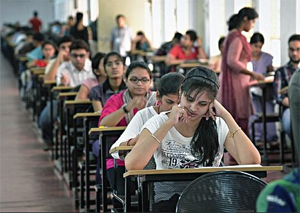New Delhi, Apr 28: The Supreme Court today cleared the decks for holding of National Eligibility Entrance Test (NEET), a single common entrance test for admission to MBBS and BDS courses, in two phases for the academic year 2016-17 in which around 6.5 lakh candidates are likely to appear.
The apex court approved the schedule put before it by the Centre, CBSE and the Medical Medical Council of India (MCI) for treating All India Pre-Medical Test (AIPMT) fixed for May 1 as NEET-1 and those who have not applied for AIPMT will be given opportunity to appear in NEET-II on July 24 and the combined result would be declared on August 17 so that the admission process can be completed by September 30.
The order would imply that all government colleges, deemed universities and private medical colleges would be covered under the NEET and those examinations which have already taken place or slated to be conducted separately stands scrapped.
The order, ending all uncertainity, was pronounced after rejecting the opposition for holding NEET by states including Tamil Nadu, Andhra Pradesh, Telangana, Uttar Pradesh and Association of Karnataka Medical Colleges besides minority institutions like CMC Vellore which had contended that NEET cannot be imposed on them.
The apex court order also revives the Government's Decemeber 21, 2010 notification for holding single common entrance test through NEET with a clarification that any challenge on the issue would directly come before it and no High Court can interfere in it.
The court was of the view that since it has recalled its April 11 order, there was no hindrance in holding the single entrance test.
"In view of the submissions made on behalf of the respondents (Centre, CBSE, MCI), we record that NEET shall be held as stated by the respondents. We further clarify that notwithstanding any order passed by any Court earlier with regard to not holding NEET, this order shall operate. Therefore, no further order is required to be passed at this stage," a bench comprising Justices A R Dave, Shiva Kirti Singh and A K Goel said.
While rejecting the contention that it would not be proper to hold NEET in view of the July 18, 2013 judgement which had scrapped the NEET, the bench said, "We do not agree with the first submission for the reason that the said judgement has already been recalled on April 11, 2016 and therefore, the notifications dated December 21, 2010 are in operation as on today."
"It may however be clarified that by this order hearing of the petitions which are pending before this Court will not be affected," the bench said.
Additional Solicitor General Pinky Anand and senior advocate Vikas Singh, appearing for the Centre and MCI respectively submitted that 6,67,637 candidates are appearing fot the All India Pre-medical/Pre-dental Entrance Test, scheduled for May 1 from 1,040 centres in 52 cities, including abroad.
They submitted that by turning the May 1 entrance exam as NEET-1 would protect the interests of students who have already left their homes for the exams and have fully prepared for it.
Tamil Nadu, through senior advocate L Nageshwar Rao, strongly objected to NEET and said there is no culture of entrance exams in the state since 2007 in view of a prevailing legislation and the marks secured in class XII is considered as qualifying marks to make a level-playing field for the rural students.
Senior advocate K K Venugopal protested passing of the order on behalf of the Association of Karnataka Medical Colleges saying that there should not by any hurry and all stakeholders should be given a detailed hearing.
Senior advocate Gopal Subramanium, appearing for CMC, Vellore said that the entrance exam by the minority institution has been for years and NEET should not come in its way.
The court also rejected the contention of senior advocates Rajeev Dhavan and P P Rao that April 11 order has not revived the NEET and it will not apply to all states which can hold separate entrance tests.
During the hearing, the bench observed that it was running "against the time".
The petition filed by NGO Sankalp Charitable Trust was listed for hearing today after it was mentioned late yesterday.
On April 11, the apex court had recalled its controversial judgement scrapping single common entrance test for admission to MBBS, BDS and PG courses in all medical colleges, delivered by then Chief Justice of India Altamas Kabir on the day of his retirement.
In its petition, the NGO said that the Centre, MCI and CBSE were dilly-dallying in implementing the court's order on implementing the National Eligibility Entrance Test.
It further said that in view of April 11 judgement decks were cleared for holding of Common Entrance Examination and there is no impediment in having the test for admission to Medical Colleges for current academic year 2016-17.
The petitioner claimed that according to a research conducted by the NGO it was found that as many as 90 entrance examinations are being held by private and government authorities separately which resulted in shelling out lakhs of rupees in taking the examination.
"It has also been widely noticed that the examinations are not conducted in a free and fair manner and admissions are granted to chosen few," the plea said.







Comments
The process has almost completed in several states. The decision to conduct the exam NEET is to be considered next year ie for 2017 admissions onwards.
Add new comment